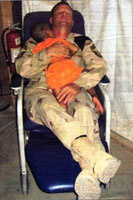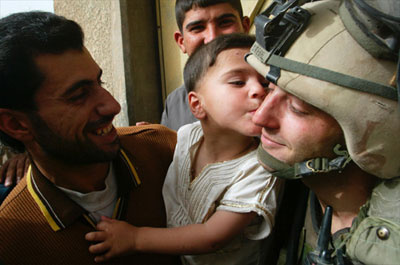 A positive side of the war in Iraq that we rarely see in the media
A positive side of the war in Iraq that we rarely see in the mediaby Heather Collura, USA Today
They were not allowed to get food, go to school or even take an injured child to a hospital, Henry said.
By the end of his seven-month deployment, he said, the United States had gained control of the city and he could hear children running around and playing soccer.
"We really did make this place so much better when we came," Henry told a standing room only crowd of more than 500 students, staff, faculty and community members at Syracuse University last week. "Nothing can replace that."
Henry, 22, a third-year Marine, was one of three veterans who shared their experiences as part of a Department of Defense outreach program called "Why We Serve." (continued…)
Marine Maj. Chris Devine, the program's director, said the group has visited at least nine other campuses this fall, including the University of Cincinnati, Georgetown University and the University of Wyoming.
For 2008, there are plans to go to Clemson (S.C.), Villanova (Pa.), American (D.C.) and Stony Brook (N.Y.) universities, among others.
"This is the future leadership of America," Devine said. "Why wouldn't you want to put our servicemembers in front of them so they can ask them direct questions and hopefully get direct answers?"
The program at Syracuse was the subject of some debate. Mark Rupert, chair of the Syracuse University Political Science Department, declined the initial invitation to host it. "It seemed to me that it was intended to substitute an allegedly 'non-political' meet and greet with the troops for a direct and explicitly political discussion of the issues," Rupert said in an e-mail.
 Professor William Coplin, who teaches the honors course on improving undergraduate education that stepped in to sponsor the event as a class project, and Katelyn Hancock, one of the student organizers, said it was not intended to be a debate on Iraq or U.S. foreign policy.
Professor William Coplin, who teaches the honors course on improving undergraduate education that stepped in to sponsor the event as a class project, and Katelyn Hancock, one of the student organizers, said it was not intended to be a debate on Iraq or U.S. foreign policy.
"It's a unique perspective," Hancock said. "We don't often get to hear from troops that have been recently over there. We (can) get in our own little bubble over here and not understand what is going on over there."
"Is it set up to sell the war in a backwards, backdoor way? I don't know," Coplin said. "It is what it is."
The Syracuse Peace Council, a community anti-war group, proposed that three additional veterans with anti-war viewpoints join the discussion, but the offer was declined.
"I admire you guys and what you are doing," Aly Wane, a member of the Syracuse Peace Council, said at the event. "I just wish this forum was open to a broader sort of experience of what the war is. … I have seen the war has many sides, and I would like to see all those sides represented."
As Wane expressed his discontent, without asking a question, all three veterans sat silently while they listened.
There were no such feelings expressed at an appearance at the University of Wyoming in Laramie, according to Tammy Johnson, staff adviser for the University of Wyoming College Republicans who hosted the program. "People asked plenty of questions. He (Maj. Cedric Burden) answered them. He was very forthright and honest."
Three other veterans spoke to University of Cincinnati history professor Thomas Lorman's three classes last week. Lorman said he had feared the event would take on political undertones. "I didn't feel there was any hostility in the room at all," he said.
Some audience members at Syracuse asked tough questions, including how the three servicemembers could speak so warmly of the job they are doing despite the high numbers of civilian casualties and the American unrest regarding the purpose of the war.
James Marcellino, a Syracuse sophomore, said any tension toward the veterans disgusted him. "It's just astounding to me to have people come at you in that way," he said to applause.
Henry and his two colleagues, Army Sgt. Jose Munoz and Air Force Tech. Sgt. Mark DeCorte, each addressed the program's title question of why they serve.
"I joined out of patriotism," said DeCorte, a 13-year veteran medic and father of four who enlisted in the 10th grade through the delayed enlistment program.
DeCorte is a 31-year-old whose wife is also active duty. His father, mother and uncle were also Air Force flight medics. "I could think of 200 reasons to get out," DeCorte said. "I could line them all up. But I just couldn't do it. I can't hang up my uniform in a closet and watch the news and know that my brothers and sisters are willing to risk their lives. And I want to be there to bring them home. So I re-enlisted for another six years — for them."
The program ended with a lengthy standing ovation from most of the crowd.
"I feel like there is another side that everyone needs to hear," said Samantha Wilder, a Syracuse freshman from Williamsburg, Va. "There are pictures we never see. There's a side we never see."
"Go to Original" links are provided as a convenience to our readers and allow for verification of authenticity. However, as originating pages are often updated by their originating host sites, the versions posted on VT may not match the versions our readers view when clicking the "Go to Original" links.
(In accordance with Title 17 U.S.C. Section 107, this material is distributed without profit to those who have expressed a prior interest in receiving the included information for research and educational purposes. VT has no affiliation whatsoever with the originator of this article nor is VT endorsed or sponsored by the originator. Any opinions expressed by the author(s) are not necessarily those of VT or representative of any staff member at VT.)
ATTENTION READERS
We See The World From All Sides and Want YOU To Be Fully InformedIn fact, intentional disinformation is a disgraceful scourge in media today. So to assuage any possible errant incorrect information posted herein, we strongly encourage you to seek corroboration from other non-VT sources before forming an educated opinion.
About VT - Policies & Disclosures - Comment Policy




